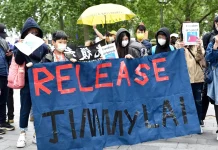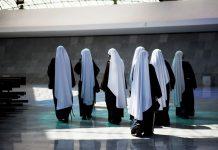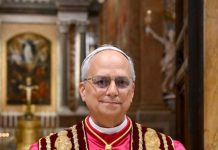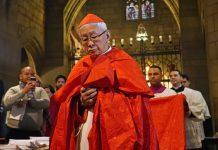Jerusalem (Tuesday, February 27, 2018, Gaudium Press) Church leaders in the Holy Land, in an unprecedented move, closed the Church of the Holy Sepulcher, the holiest site in Christendom, on Sunday to protest both the recent taxation of church properties and a proposed parliamentary bill that would permit the Israeli government to appropriate land that various churches have sold to anonymous buyers.
According to The Associated Press, the leaders of the Catholic, Greek Orthodox and the Armenian Apostolic Churches in the Holy Land called the moves an attempt to “weaken the Christian presence in Jerusalem.”
In a statement, Cardinal Edwin O’Brien, grand master of the Equestrian Order of the Holy Sepulcher of Jerusalem, said the closing of the church – the location of Jesus’ tomb, according to Tradition – was “a rare and desperate initiative to keep Christian life alive in the Holy Land.”
Earlier this month, the Jerusalem municipality sent out tax bills to church-owned and United Nations-owned properties that, the city claims, do not provide religious services.
Since the 16th century, successive governments (Ottoman, British, Jordanian and Israeli) have exempted the churches from having to pay property tax, an accommodation that has saved the churches millions of dollars.
In a Feb. 15 joint statement, the heads and patriarchs of several churches noted that civil authorities dating back to the Ottoman period “have always recognized and respected the great contribution of the Christian Churches, which invest billions in building schools, hospitals and homes, many for the elderly and disadvantaged, in the Holy Land.”
The leaders called on the municipality to “ensure that the status quo, which was sanctioned by the sacred history, is maintained and the character of the Holy City of Jerusalem is not violated.”
The city’s unprecedented tax initiative “both undermines the sacred character of Jerusalem and jeopardizes the church’s ability to conduct its ministry in this land on behalf of its communities and the worldwide church,” the leaders said. “We stand firm and united in our position to defend our presence and properties.”
Mayor Wants Money
The government ultimately hopes to collect about $188 million from 887 properties.
The move reportedly follows consultations with Gabriel Hallevy, an Israeli specialist in international law, who believes the tax exemption the Israeli government has long granted should not apply to properties like church-owned hotels, halls and shops that have no overtly religious purpose.
Mayor Nir Barkat told reporters that the exemption has cost the city $285 million.
“It is absurd for Jerusalem residents to fund municipal services for the churches and the U.N. on their own and for the municipality to be prevented from collecting enormous sums that could significantly improve the city’s development and services,” said the Jerusalem municipality.
“If the state wishes the current situation to continue, we demand that it fully compensate us for those sums,” Barkat said.
The mayor’s decision to tax the churches comes at a time of growing tensions between the municipality and the national government over the city’s budget. Barkat claims that the finance ministry has not paid the special grant the government provides to Jerusalem every year because it is both the capital and the holy city and has a relatively poor population.
The ministry claims it has contributed more money to the city than ever before.
Land Sales Questioned
Arab and Jewish residents of Jerusalem were already questioning whether the churches should enjoy so much fiscal and legal independence following revelations that the cash-strapped Greek Orthodox Church – believed to be the second-largest land owner in Israel – has sold many tracts of land it had leased to the Israel government for 99 years to private investors without the knowledge of those living on the land.
Apartment owners reportedly could either find themselves evicted when the church’s leases, transferred to the new landlords, expire in 10, 20 or 30 years, or be forced to pay a substantial sum of money to renew their leases.
Furthermore, Arab residents of the Old City of Jerusalem are livid at the Church for selling land in Arab sections of the city to Jewish Israeli developers, because it could undermine the creation of a future Palestinian state with East Jerusalem as its capital.
Rabbi David Rosen, the director of the American Jewish Committee’s Department of Interreligious Affairs, said the mayor may have the legal authority to demand an end to the exemption because it has never been codified in Israeli law.
The existing exemptions “are an act of magnanimity” by the Israeli government that recognizes “the special place of the churches in Jerusalem and the Holy Land,” Rosen said. “Israel has been under no legal obligation to do so, and before them the Jordanians and the British.”
Holy See Negotiations
Israel’s current negotiations with the Holy See are designed to codify these exemptions.
According to observers with knowledge of these negotiations, Israel has been dragging its feet due to fears that once it provides the Catholic Church with a sweeping tax exemption, other churches – and Jewish and Muslim religious leaders – will demand the same exemptions for their institutions.
Although synagogues and mosques, like Christian churches, do not have to pay property taxes, many other institutions built on land owned by religious authorities are not tax-exempt.
Farid Jubran, the general counsel for the Custody of the Holy Land, which maintains and oversees all properties owned by the Catholic Church here, said the Church was shocked to receive the municipal tax bill.
“The measures are against properties that are also used for religious purposes,” Jubran said, “for example, the Sisters of St. Joseph Hospital. Within the hospital, there is a convent for the nuns, as well as a church. The same is true of Notre Dame [of Jerusalem Center],” a pilgrim hotel that also has a large and active church and offices for Church officials.
Jubran called the demand for taxes “a change in the religious status quo,” and a very rude one at that.
“The way it was done … just a month or two ago, the mayor was visiting the churches to deliver Christmas greetings, and he didn’t mention anything. Instead of communicating with us, he went straight to the press. And he described the churches in an ugly manner, as tax evaders.”
Even worse, Jubran said, is the fact that the municipality is seeking back taxes: “It is one thing to say this is the policy going forward. It is another thing to demand taxes going back seven years.”
Source Catholic Register/Michele Chabin





































